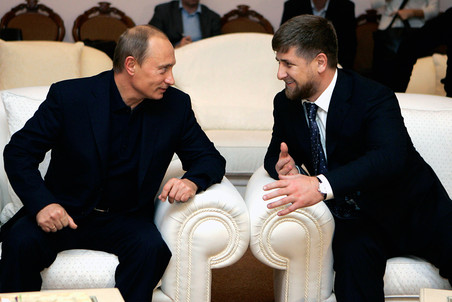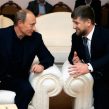
Chechen Leader Once Again Demonstrates His Unique Role in Putin’s Russia
Publication: Eurasia Daily Monitor Volume: 12 Issue: 23
By:

According to experts, for a long time only two or three regional politicians in Russia could play an important role at the federal level—two of them being the mayor of Moscow and the president of Tatarstan (Carnegie.ru, January 22). Leaders of the North Caucasus republics never had an independent political role at the federal level. But Chechen ruler Ramzan Kadyrov has apparently become precisely the type of regional politician who has risen to the level of a national politics due to his special relationship with the Russian president. No other politician from the North Caucasus could even dream of rising to such a level of prominence.
The phenomenon of Ramzan Kadyrov’s rise is tied to Vladimir Putin, not to the government, the state security services or the army, as is usually the case (Izvestia, May 29, 2013). All regional officials try to find a figure in the Russian presidential administration to promote them and defend them from their enemies. In the case of Kadyrov, the entire Russian presidential administration is working for him, although it is unlikely that Russian officials are actually loyal to the ruler of Chechnya. However, since the Russian president is on Kadyrov’s side, the Kremlin administration cannot challenge the Chechen strongman.
The recent large rally in Grozny against insults to the Prophet Muhammad by French caricaturists was an example of Moscow’s special policies in Chechnya, illustrating how Kadyrov is allowed to do things others are not allowed to do (rbc.ru, January 19). The rally was the largest not only in Chechen history, but in the history of the North Caucasus as a whole. On the other hand, none of the six million Russian Tatars organized a rally in Kazan or in Moscow. Nor did the two million Muslims in Bashkortostan organize a rally in Ufa. Indeed, Muslims in other Russian regions with large Muslim populations not organize protest rallies either. And even the chairman of the Union of Muftis of the Russian Federation, Ravil Gainutdin, who visited the rally in Grozny, failed to organize even a small gathering of people unhappy with the caricatures of the Prophet. Evidently, only Ramzan Kadyrov received permission to organize a million-strong rally, and he even publicized it in the Arab world. Kadyrov’s government invited well-known scholars of Islam, Muslim preachers from abroad, and the Muslim leaders from the Russian Federation (ng.ru, January 21).
By permitting the rally in Grozny, Moscow achieved two goals. First, it showed that Kadyrov was not only a national politician in Russia, but also a member of the international Islamic community. Second, Moscow signaled to the West that some citizens of Russia are not simply disgruntled about the West, but opposed to Western values. No Muslim leader of Russia can boast the same amount of support from the Russian foreign ministry to promote international ties as Kadyrov. The Chechen leader has long become a frequent guest in the palaces of the Middle Eastern ruling dynasties. In one recent example, the Jordanian security services held joint exercises with a Chechen security unit that traveled to Jordan for a ten-day training visit (Grozny.tv, January 30). Moreover, Kadyrov has gathered an enormous collection of personal belongings of the Prophet, which also promotes his leading role among the world’s Muslims (News.tj, November 14, 2014).
Even the attack on December 4, 2014 (Business-gazeta.ru, December 4, 2014), when a group of militants unexpectedly descended on Grozny and fought for several hours, was presented by pro-Kremlin experts as a victory for Kadyrov since he managed to suppress the assailants on his own (Pravda-tv.ru, December 9, 2014). In response to the militant attack, the Chechen ruler organized a parade of forces, which are under his command rather than being part of the Russian federal forces. Speaking before the 20,000 Chechen troops, Kadyrov pledged allegiance to the supreme commander, President Vladimir Putin. Touching on Putin’s main worry of the moment, the conflict in Ukraine, Kadyrov stated that he was prepared to go immediately to eastern Ukraine to fight against Ukrainian forces (Lifenews.ru, December 28, 2014).
In reality, Kadyrov’s public demonstration was a reaction to the December 4 militant attack. The Chechen leader reminded Putin that he was prepared to fight for the Russian president’s recognition. Another pledge of loyalty to Putin was not necessarily needed. By doing so, however, he reaffirmed his status as a loyal defender of the Russian head of state. The Kremlin must have appreciated the pledge by Putin’s favorite minion among the regional leaders.
So why does Moscow not promote Kadyrov to a federal-level post in the country’s capital? First, a majority of Russians still retain a highly negative attitude toward Chechens as a result of the anti-Chechen hysteria that swept Russia in the 1990s. Second, the Russian Armed Forces, Ministry of Interior and the Federal Security Service (FSB) would be unhappy about promoting Kadyrov, since he does not bow to their rules of behavior, which makes him completely unpredictable for them. Third, Kadyrov himself does not want to leave Chechnya, because the change of milieu would probably be too great for him to bear. The Kremlin will have to either increase Kadyrov’s authority further or make drastic changes to governance in the region against the backdrop of the growing threats from the organization Islamic State.




